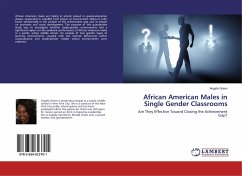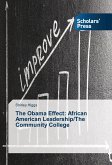During the last twenty years, the status and performance of African American males in education has been one of the most consistently researched topics (Jackson & Moore III, 2006; Jenkins, 2006). These analyses have usually presented a disconcerting picture of disengaged African American males being habitually outperformed by their counterparts (Noguera, 2003, 2009; Jenkins, 2006). Based on these observations and the aforementioned belief that students with favorable educational experiences are more likely to experience professional prosperity in adulthood (Jackson & Moore III, 2006), it is necessary to examine the factors which threaten African American male s academic engagement and performance (Davis, 2003; Duncan, 2002; Jen kins, 2006; McMillian, 2003; Maton, Hrabowski & Greif, 1998; Reese, 2004; Sanders, 1997). Understanding the perceptions of adolescent African American males as it relates to understanding their own motivational values and how those values translate in to behaviors that may impact their performance in the classroom is vital to improving overall performance.
Bitte wählen Sie Ihr Anliegen aus.
Rechnungen
Retourenschein anfordern
Bestellstatus
Storno








